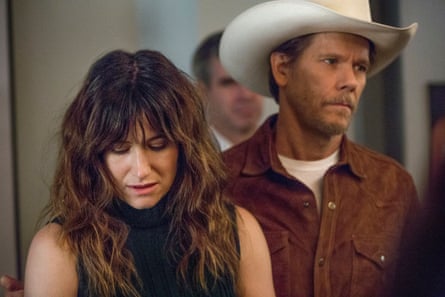Since I heard the exhilarating news that Jill Soloway, the creator of Transparent, was making a series out of Chris Kraus’s 1997 comic novel I Love Dick (premiering on Amazon on 12 May), I’ve been tracking the project on Google alerts. Half of the entries have been personal ads – “I love dick, looking for a hot man to play with” – mostly from Craigslist, written by gay men stating what they want in no uncertain terms.
Kraus’s heroine, who is called Chris (played by Kathryn Hahn), is also clear about her desire. Waking up from a dream halfway through the book, she has the following revelation: “My entire state of being’s changed because I’ve become my sexuality: female, straight, wanting to love men, be fucked. Is there a way of living with this like a gay person, proudly?”
Chris, a 39-year-old experimental film-maker, is a stalker bent on seducing Dick – her husband’s colleague. She does so with her husband’s blessing. She loves both dick and Dick but, despite investing an enormous amount of energy in the pursuit, she can’t seem to get either one.
Her primary wile is unbridled correspondence. She writes Dick letter after letter covering topics ranging from a Japanese courtesan’s poetry to torture victims in Guatemala, weaving in her intense feelings for him. The project, “all of which really happened”, the writer Chris Kraus assures us, deepens the complicity between husband and wife, whose relationship was on the verge of collapse. Chris’s seduction attempt soon morphs from desperate last resort to potential art project (the couple imagine going to Dick’s house and plastering it with Chris’s letters) to unrequited romantic obsession that threatens to destroy rather than heal their marriage.

The heroine, like all Chris Kraus’s literary protagonists (I Love Dick is the first novel of a trilogy), is a radical loser. She is a professional failure as a film-maker, as well as a failure as a conventionally attractive object of desire. She writes:
Back in Columbus, Bill Horrigan, Media Curator at the Wexner, asked me how I ‘really’ managed to support myself. I was picking up the restaurant check and driving a new car and obviously this cover story about an art school teaching job fooled no one. ‘It’s simple,’ I told him. ‘I take money from Sylvère [her husband].’ Was Bill bothered that such a marginal sexless hag as me wasn’t living in the street?
While we’re comfortable with the comic male loser in literature – a figure who spends his time stuffing his face and masturbating in a basement to images of the women who have rejected him – his loser sister is a much trickier bird.
Let’s imagine, for example, a parallel version of this male loser: a woman in sweatpants stuffing her face with pizza while she watches TV and masturbates to men who have spurned her. Does she exist? Would she even be allowed? As Kraus suggests, rather than someone we would be amused by, we would see her as a pariah figure, as someone who frightens us. We flee, avert our eyes, cataloguing her as the “marginal sexless hag”, or worse, the bag lady on the street.
So why is it so hard to write the comic female loser?
To start with, as Elaine Blair points out in her New Yorker piece, failure due to sexism and stifling social conventions is hardly a laughing matter. But Chris, though she does find herself confronting these obstacles, doesn’t privilege the tragic angle. While she analyzes and occasionally bristles at the sexism on display in the art world, she makes it clear that her own artistic failure is not only about the patriarchy. It’s also about her dubious talent.
Comedy comes from being fallible, not oppressed. With her almost cheerful narration, the Kraus heroine, whose name changes but whose identity is the same in each book of the trilogy, plays her loserdom for laughs. Of Silvie, the protagonist of the third novel, Torpor, Kraus writes: “Once, she’d ghost-written a wealthy woman’s doctoral thesis. The job gave her a library card and paid her bills all summer, but in the fall the client got a PhD and she went back to topless dancing.”
There’s a preposterous choice involved here that may look like self-sabotage at the outset. If it’s so easy for her to write a doctoral thesis, why doesn’t she write one for herself? Instead, her unsung intellectual labors done, she returns to the topless bar.
Why? Partly because these are her people; her New York of the 1970s consists of not the Patti Smiths but all those who didn’t make it, and not only because she is one of them. These are the people who appeal to her, touch her imagination. But, most importantly, it is from this position that she finds she has something to say.
What appeared to be self-sabotage was actually salvation. Embracing failure, including the ongoing failure to “get her man”, has given her a voice. It is at the moment that she embraces her loserdom that she becomes interesting to herself.
While other people might see her as a “marginal sexless hag”, the female loser finds herself interesting. In the same way the male loser hero playing with his dick in the basement finds himself interesting enough to protagonize a 300-page novel, so does his counterpart, the woman shoving popcorn into her fat face as she zaps and touches her clitoris. And the really unacceptable part of this image – the part that isn’t allowed – is for this female figure to be hedonistic like her male counterpart. For him, the woman is one in a series of objects (pizza, dick, porn flick) that could provide pleasure. In her case, a different economy is required: the guy has to be the one thing, the only thing she doesn’t get.
But what if, on the contrary, as in the case of Kraus’s heroine, this failure becomes not the end point but the starting point from which she creates?

Another writer from a different era, mid-20th century, comes to mind: Jean Rhys, whose romantic loserdom provided her with endless fodder for her work.
Like the Kraus heroine, the Rhys heroine is a version of the same woman in all her books. Her characters – single, childless women who drink too much and are no longer desired by the men whose protection they seek – were not always such rejects. They were once in the running. But now they’re not so beguiling: they’re poor, pathetic, or ageing, hardened, opportunistic underdogs. Their stories are primarily tragic, subject to a system rigged against them.
Yet, like Kraus’s heroines, they elude the role of victims by failing on their own merits, messing things up, over and over again. If the men are behaving badly, they’re behaving just as badly, if not worse.
This difficult, unpalatable heroine interests herself, but can she interest the public? Apart from Wide Sargasso Sea, which tells the story of the woman in the attic from Jane Eyre – also a loser but beautiful and, having been labeled as crazy, comfortably locked up rather than running loose – Jean Rhys’ books received little recognition at the time of their publication and are still books “for the few”.

When it came out in 1997, I Love Dick became a cult classic within a small circle, but was a failure in marketing terms. It was reissued in 2006 and, with boosts from various celebrities, including Lena Dunham, it has gained readers and notoriety. With Soloway’s intervention, the novel will be reaching something like what we call the mainstream. What is going on? Has the time come for this formerly pariah figure, the radical female loser?
And, if so, how did it happen? Elaine Blair writes:
The comedy of I Love Dick shows us an overlooked milestone. Somewhere between second-class status and full equality, there is a point at which women are expected to make their own way in the world, as men do. How can we tell that we’ve passed this milestone? It’s not by the presence of a few successful women like, say, Nan Goldin (the Kraus protagonist’s idol), but by the widespread feelings of inadequacy, envy, and anxiety that a success like Goldin’s inspires in her peers like Chris. This is existential freedom, and this is where the female antihero comes in.
In this new terrain, where female liberation becomes not access to winnerdom, but access to loserdom, female comics have been spreading their wings, with the likes of Tina Fey, Lena Dunham and Amy Schumer leading the break-through. The recent wrap-up of Girls marks the end of an era in which viewers have been infuriated and riveted by its deeply solipsistic female characters, and especially Hannah Horvath, not only cyclically failing on all fronts, but also blithely unconcerned with winning our approval.
And although there have been important forays in literature as well – the work of Miranda July and Sheila Heti among them – there is still something breathtakingly edgy about the Kraus version. You cling to the couch as you’re reading, all your securities giving way.
In the final tome of Kraus’s trilogy, Torpor, the heroine, her husband and their little sick dog, Lily, set off into the disaster zone of post-Ceausescu’s Romania, with the deeply felt, if absurdly impractical, plan to adopt an orphan. This is after three abortions, which her husband has insisted upon.
Here, the solution for the floundering marriage is even more precarious than in the I Love Dick case, and even more destined to fail. The extremity of the situation, which tackles not only one woman’s story, but the story of any flailing country and of any floundering relationship, makes you queasy not only with despair and recognition, but also with uncertainty. You have no idea where she’s going to take you.
When the Chris Kraus heroine first showed up, we were not ready to engage with her, or only a few of us were. She still baffles us, still frightens us, but she compels us, too, in her ability to develop an imaginary of something else. As much of the headway on the comic female loser has been made through the medium of television, it’s not surprising that that’s where Kraus’s still unsettling vision is being celebrated today.
While the male gaze might view the Kraus heroine as the “marginal, sexless hag”, the female gaze sees her in a different light: as someone interesting, whose existential freedom could include being able to “march boldly into self-abasement” or, for that matter, to jack off into a bowl of potato chips.
As Eileen Myles writes in her foreword: “When I Love Dick came into existence, a new kind of female life did, too.”

Comments (…)
Sign in or create your Guardian account to join the discussion